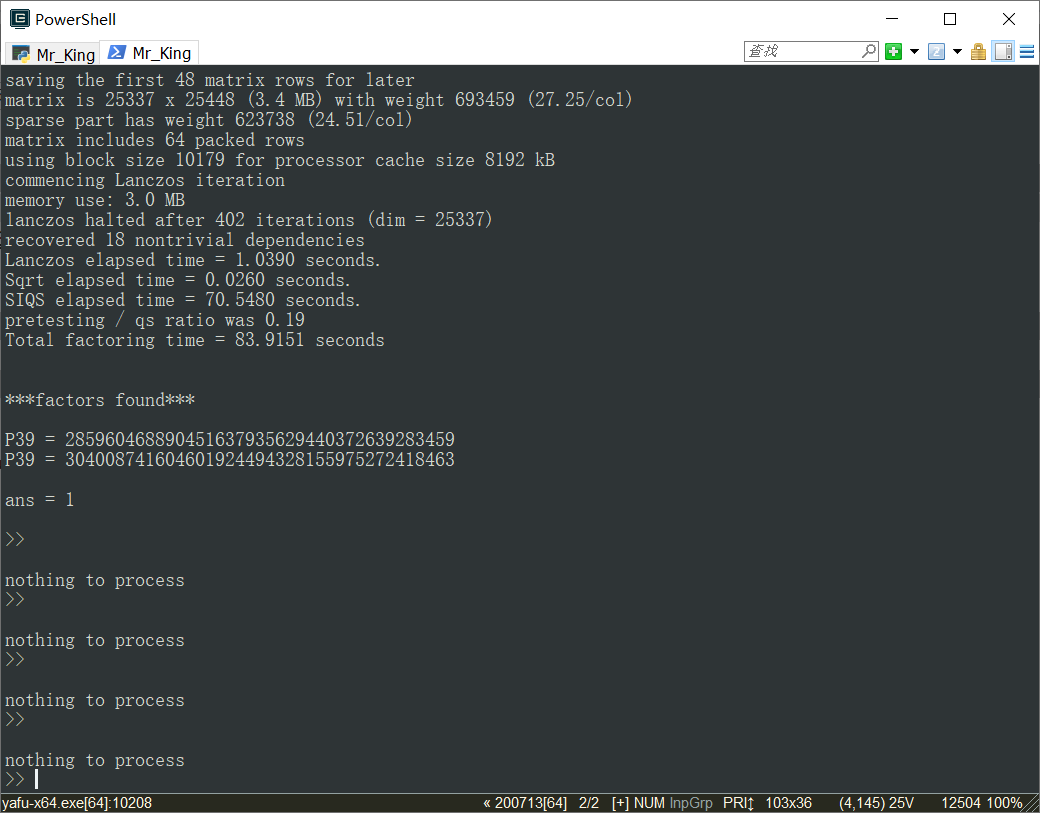RAS加密原理
|步骤|说明|描述|备注| |–|–|–|–| | 1 | 找出质数 | P、Q| -| |2|计算公共模板|N=P*Q|-| |3|欧拉函数|φ(N) = (P-1)(Q-1)|-| |4|计算公钥E|1 < E < φ(N)|E的取值必须是整数E 和 φ(N) 必须是互质数| |5|计算私钥D|E * D % φ(N) = 1|-| |6|加密|C = M ^E mod N|C:密文 M:明文| |7|解密|M =C^D mod N|C:密文 M:明文 |8|dp|-|dp=d mod (p-1)| |9|dq|-|dq=d|-|dq=d mod (q-1)| |10|qinv|-|qinv=q^-1 mod p(逆元)|
m1 = c^dp mod p = 2790^53 mod 61 = 4;
m2 = c^dq mod q = 2790^49 mod 53 = 12;
h = (qinv * (m1 - m2)) mod p = (38 * -8) mod 61 = 1;
m = m2 + h * q = 17 + 1 * 53 = 65
rsa给flag.enc和pub.key
 第一步:在kali中使用命令:
第一步:在kali中使用命令:
openssl rsa -pubin -text -modulus -in warmup -in pub.key
 得到E:65537
得到 N:C0332C5C64AE47182F6C1C876D42336910545A58F7EEFEFC0BCAAF5AF341CCDD
转化为十进制得到N=:86934482296048119190666062003494800588905656017203025617216654058378322103517
得到E:65537
得到 N:C0332C5C64AE47182F6C1C876D42336910545A58F7EEFEFC0BCAAF5AF341CCDD
转化为十进制得到N=:86934482296048119190666062003494800588905656017203025617216654058378322103517
s= 'C0332C5C64AE47182F6C1C876D42336910545A58F7EEFEFC0BCAAF5AF341CCDD'
int(s,16)
86934482296048119190666062003494800588905656017203025617216654058378322103517
第二步:
分解N
得到P=285960468890451637935629440372639283459
得到Q=304008741604601924494328155975272418463

第三步:分解N得出P和Q以便求出私钥D 第四步:求出D
#coding=utf-8
import math
import sys
from Crypto.PublicKey import RSA
arsa=RSA.generate(1024)
arsa.p=
arsa.q=
arsa.e=
arsa.n=arsa.p*arsa.q
Fn=long((arsa.p-1)*(arsa.q-1))
i=1
while(True):
x=(Fn*i)+1
if(x%arsa.e==0):
arsa.d=x/arsa.e
break
i=i+1
private=open('private.pem','w')
private.write(arsa.exportKey())
private.close()
在kali中运行后会在home中生成一个名为private.pem的文件 下载rsatool,生成秘钥
python2 rsatool.py -o private.pem -e 65537 -p 285960468890451637935629440372639283459 -q 304008741604601924494328155975272418463
第五步:解密
在kali终端输入openssl进入openssl
输入
openssl rsautl -decrypt -in flag.enc(密文名称) -inkey private.pem(我们所求得密钥名称)
rsa脚本
已知dp,n,e,c求明文m
import gmpy2 as gp
e = 65537
n = gp.mpz(248254007851526241177721526698901802985832766176221609612258877371620580060433101538328030305219918697643619814200930679612109885533801335348445023751670478437073055544724280684733298051599167660303645183146161497485358633681492129668802402065797789905550489547645118787266601929429724133167768465309665906113)
dp = gp.mpz(905074498052346904643025132879518330691925174573054004621877253318682675055421970943552016695528560364834446303196939207056642927148093290374440210503657)
c = gp.mpz(140423670976252696807533673586209400575664282100684119784203527124521188996403826597436883766041879067494280957410201958935737360380801845453829293997433414188838725751796261702622028587211560353362847191060306578510511380965162133472698713063592621028959167072781482562673683090590521214218071160287665180751)
for x in range(1, e):
if(e*dp%x==1):
p=(e*dp-1)//x+1
if(n%p!=0):
continue
q=n//p
phin=(p-1)*(q-1)
d=gp.invert(e, phin)
m=gp.powmod(c, d, n)
if(len(hex(m)[2:])%2==1):
continue
print('--------------')
print(m)
print(hex(m)[2:])
print(bytes.fromhex(hex(m)[2:]))
已知n,dp,dq,c求d和明文m
import gmpy2 as gp
p = gp.mpz()
q = gp.mpz()
dp = gp.mpz()
dq = gp.mpz()
c = gp.mpz()
n = p*q
phin = (p-1)*(q-1)
dd = gp.gcd(p-1, q-1)
d=(dp-dq)//dd * gp.invert((q-1)//dd, (p-1)//dd) * (q-1) +dq
print(d)
m = gp.powmod(c, d, n)
print('-------------------')
print(m)
print(hex(m)[2:])
已知n,e,c求m
import gmpy2
def Decrypt(c,e,p,q):
L=(p-1)*(q-1)
d=gmpy2.invert(e,L)
n=p*q
m=gmpy2.powmod(c,d,n)
flag=str(m)
print("flag{"+flag+"}")
if __name__ == '__main__':
p = 9648423029010515676590551740010426534945737639235739800643989352039852507298491399561035009163427050370107570733633350911691280297777160200625281665378483
q = 11874843837980297032092405848653656852760910154543380907650040190704283358909208578251063047732443992230647903887510065547947313543299303261986053486569407
e = 65537
c = 83208298995174604174773590298203639360540024871256126892889661345742403314929861939100492666605647316646576486526217457006376842280869728581726746401583705899941768214138742259689334840735633553053887641847651173776251820293087212885670180367406807406765923638973161375817392737747832762751690104423869019034
Decrypt(c,e,p,q)
已知n,e求秘钥d
import gmpy2
from Crypto.Util import number
p = 473398607161
q = 4511491
e = 17
d = gmpy2.invert(e,(p-1)*(q-1))
print (d)
已知n,e求秘钥d和key
import gmpy2
import rsa
p = 285960468890451637935629440372639283459
q = 304008741604601924494328155975272418463
e = 65537
n = 86934482296048119190666062003494800588905656017203025617216654058378322103517
d = gmpy2.invert(e,(q-1)*(p-1))
print(d)
d = 81176168860169991027846870170527607562179635470395365333547868786951080991441
key = rsa.PrivateKey(n,e,d,p,q)
print(key)
with open("flag.enc","rb") as f:
print(rsa.decrypt(f.read(),key).decode())
已知c1,c2,e1,e2,n求明文m(共模攻击)
from gmpy2 import *
import libnum
n=22708078815885011462462049064339185898712439277226831073457888403129378547350292420267016551819052430779004755846649044001024141485283286483130702616057274698473611149508798869706347501931583117632710700787228016480127677393649929530416598686027354216422565934459015161927613607902831542857977859612596282353679327773303727004407262197231586324599181983572622404590354084541788062262164510140605868122410388090174420147752408554129789760902300898046273909007852818474030770699647647363015102118956737673941354217692696044969695308506436573142565573487583507037356944848039864382339216266670673567488871508925311154801
e1=11187289
e2=9647291
s = gcdext(e1, e2)
s1 = s[1]
s2 = -s[2]
c1=22322035275663237041646893770451933509324701913484303338076210603542612758956262869640822486470121149424485571361007421293675516338822195280313794991136048140918842471219840263536338886250492682739436410013436651161720725855484866690084788721349555662019879081501113222996123305533009325964377798892703161521852805956811219563883312896330156298621674684353919547558127920925706842808914762199011054955816534977675267395009575347820387073483928425066536361482774892370969520740304287456555508933372782327506569010772537497541764311429052216291198932092617792645253901478910801592878203564861118912045464959832566051361
c2=18702010045187015556548691642394982835669262147230212731309938675226458555210425972429418449273410535387985931036711854265623905066805665751803269106880746769003478900791099590239513925449748814075904017471585572848473556490565450062664706449128415834787961947266259789785962922238701134079720414228414066193071495304612341052987455615930023536823801499269773357186087452747500840640419365011554421183037505653461286732740983702740822671148045619497667184586123657285604061875653909567822328914065337797733444640351518775487649819978262363617265797982843179630888729407238496650987720428708217115257989007867331698397
e2=9647291
c2 = invert(c2, n)
m = (pow(c1,s1,n) * pow(c2 , s2 , n)) % n
print (m)
print (libnum.n2s(m))
e=1
#/usr/bin/env python3
#coding:utf-8
import binascii
import gmpy2
N_hex=0x180be86dc898a3c3a710e52b31de460f8f350610bf63e6b2203c08fddad44601d96eb454a34dab7684589bc32b19eb27cffff8c07179e349ddb62898ae896f8c681796052ae1598bd41f35491175c9b60ae2260d0d4ebac05b4b6f2677a7609c2fe6194fe7b63841cec632e3a2f55d0cb09df08eacea34394ad473577dea5131552b0b30efac31c59087bfe603d2b13bed7d14967bfd489157aa01b14b4e1bd08d9b92ec0c319aeb8fedd535c56770aac95247d116d59cae2f99c3b51f43093fd39c10f93830c1ece75ee37e5fcdc5b174052eccadcadeda2f1b3a4a87184041d5c1a6a0b2eeaa3c3a1227bc27e130e67ac397b375ffe7c873e9b1c649812edcd
e_hex=0x1
c_hex=0x4963654354467b66616c6c735f61706172745f736f5f656173696c795f616e645f7265617373656d626c65645f736f5f63727564656c797d
c_hex = gmpy2.mpz(c_hex)
N_hex = gmpy2.mpz(N_hex)
i = 0
while i<10:
m_hex = hex(c_hex + gmpy2.mpz(hex(i))*N_hex)
print(m_hex[2:])
try:
print(binascii.a2b_hex(m_hex[2:]).decode("utf8"))
except binascii.Error as e:
print("位数非偶数,跳过...")
i += 1
e=2
#!/usr/bin/python
# coding=utf-8
# 适合e=2
import gmpy
import string
from Crypto.PublicKey import RSA
# 读取公钥参数
with open('./tmp/pubkey.pem', 'r') as f:
key = RSA.importKey(f)
N = key.n
e = key.e
p = 275127860351348928173285174381581152299
q = 319576316814478949870590164193048041239
with open('./tmp/flag.enc', 'r') as f:
cipher = f.read().encode('hex')
cipher = string.atoi(cipher, base=16)
# print cipher
# 计算yp和yq
yp = gmpy.invert(p,q)
yq = gmpy.invert(q,p)
# 计算mp和mq
mp = pow(cipher, (p + 1) / 4, p)
mq = pow(cipher, (q + 1) / 4, q)
# 计算a,b,c,d
a = (yp * p * mq + yq * q * mp) % N
b = N - int(a)
c = (yp * p * mq - yq * q * mp) % N
d = N - int(c)
for i in (a,b,c,d):
s = '%x' % i
if len(s) % 2 != 0:
s = '0' + s
print s.decode('hex')
e=3
#!/usr/bin/env python
#coding:utf-8
import gmpy2
from Crypto.PublicKey import RSA
public_key = "./tmp/pubkey.pem"
cipher_file = "./tmp/flag.enc"
#读入公钥
with open(public_key, "r") as f:
key = RSA.importKey(f)
n = key.n
e = key.e
#读入密文
with open(cipher_file, "r") as f:
cipher = f.read().encode("hex")
cipher = int(cipher, 16)
#print(cipher)
#破解密文
def get_flag():
i = 0
while True:
if(gmpy2.iroot(cipher+i*n, 3)[1] == True):
flag_bin = int(gmpy2.iroot(cipher+x*n, 3)[0])
flag = hex(flag_bin)[2:-1].decode("hex")
print(flag)
break
i += 1
def get_flag_for():
for x in xrange(118600000, 118720000):
if(gmpy2.iroot(cipher+x*n, 3)[1] == 1):
flag_bin = int(gmpy2.iroot(cipher+x*n, 3)[0])
flag = hex(flag_bin)[2:-1].decode("hex")
print(flag)
break
if __name__ == "__main__":
get_flag_for()
#get_flag()
低解密指数攻击(e较大)
import RSAwienerHacker
n=
e=
d = RSAwienerHacker.hack_RSA(e,n)
if d:
print(d)
import hashlib
flag = "flag{" + hashlib.md5(hex(d)).hexdigest() + "}"
print flag
e,m相同,存在两个n有公约数
import gmpy2
from gmpy2 import invert, iroot
import gmpy2 as gp
from libnum import xgcd, invmod
n=[,,,,,,,,,,,,,,,,,,,]
for i in n:
for j in n:
if (i<>j):
pub_p=gmpy2.gcdext(i,j)
if (pub_p[0]<>1)&(i>j):
print i
print j
print pub_p[0]
a=i,p=pub_p[0]
q=a/p
p = gp.mpz()
q = gp.mpz()
e = gp.mpz()
c = gp.mpz()
n = p*q
phi = (p-1) * (q-1)
d = gp.invert(e, phi)
m = pow(c, d, n)
print hex(m)
e取随机数自减至与欧拉函数互质
from gmpy2 import invert,gcd
from binascii import a2b_hex
p = 177077389675257695042507998165006460849
q = 211330365658290458913359957704294614589
c = 2373740699529364991763589324200093466206785561836101840381622237225512234632
n = 37421829509887796274897162249367329400988647145613325367337968063341372726061
phi = (p-1) * (q-1)
print(p,q,n,phi)
for e in range(70100,39000,-1):
if gcd(e,phi) != 1:
continue
try:
d = invert(e,phi)
m = pow(c,d,n)
m = "%x" % m
m = a2b_hex(m.encode())
print(m.decode("ASCII"))
except Exception:
pass
import random
def egcd(a, b):
if a == 0:
return (b, 0, 1)
else:
g, y, x = egcd(b % a, a)
return (g, x - (b // a) * y, y)
def modinv(a, m):
g, x, y = egcd(a, m)
if g != 1:
return 404 #因为20000个数中不是每个e都能求出d,所以这里对求d报错时进行了简单处理
else:
return x % m
fw=open("plaintext.txt","w")
p = 177077389675257695042507998165006460849
q = 211330365658290458913359957704294614589
n = 37421829509887796274897162249367329400988647145613325367337968063341372726061
c = 2373740699529364991763589324200093466206785561836101840381622237225512234632
phi=(p-1)*(q-1)
for e in range(50000,70000):
d=modinv(int(e),(p-1)*(q-1))
if(d==404):
continue
else:
fw.writelines(hex(int(pow(c,d,p*q))))
fw.writelines("n")
最优非对称加密填充
#!/usr/bin/python
# coding=utf-8
#最优非对称加密填充
from Crypto.PublicKey import RSA
from Crypto.Cipher import PKCS1_OAEP
with open('./tmp/pubkey.pem', 'r') as f:
key = RSA.importKey(f)
N = key.n
e = key.e
print N
print e
with open('./tmp/private.pem', 'r') as f:
private = RSA.importKey(f)
oaep = PKCS1_OAEP.new(private)
with open('./tmp/flag.enc', 'r') as f:
print oaep.decrypt(f.read())